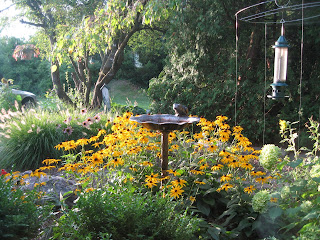
Do you want me to say it again? They say the average person has to read or hear something SEVEN - yes, I said SEVEN times before it is actually retained in the brain. Boy are we dense or what? There are FOUR things in genealogy that I think need to be restated as many times as possible - some people still won't get it. But hey, at least I am trying...
- Spelling don't count
- Review Review Review
- Do your census homework
- Cite your sources
Those four things will carry you far IF you take them to heart - let me explain.
- Spelling don't count - in the world of genealogy spelling names exactly as your remember them doesn't matter to much to people of different ethnic backgrounds who may or may not be able to successfully interpret what it is your ancestor is telling him. Krugman becomes Krockman when a German talks to a Scot. No where on the census form does it give the ethnic background of the person taking the census so trying to guess how your surname may have been written can be a real challenge. So if you are really hung up on the correct spelling of your ancestors surname, ask me about the quilt shop I know of. They'd love for you to come in and take up quilting.
- Review Review Review - no matter how hard you try, no matter how hard you work, there is ALWAYS going to be some little detail that maybe just doesn't work in your file right now. But next year or the year after it fits perfectly! In my file organization project I am finding obits & other documentation - each paper is being reviewed, each tiny detail being checked against my data base. Its amazing the tiny details that are overlooked in our excitement at finding the document. You will find yourself going back to reread, review, recheck those documents over & over. I promise!
- Do Your Census Homework - No, I am not kidding! Each and every direct line ancestor should be located on every census available for his lifetime. The amount of information that can be gleaned from those census records is so understated. Tracing the paths of your ancestors tells you where to look for records regarding his life, his family and more. How do you know where to search for those records without knowing where he lived? Census takers were given rules on how to enumerate, but often they stepped outside the box, adding full birth dates or county names and other tidbits. Without taking the time to locate your ancestors on the census its like leaving Christmas presents unopened under the tree. You wouldn't do that would you?
- Cite Your Sources - I know you've got tons of excuses of why this doesn't apply to you - but it does? Its simple, doesn't require rocket science brain to do it, there are some excellent books out there on sourcing, find something that works for you & USE IT! I see ads for companies wanting people to write children's books (fairy tales) all the time. If you are not sourcing your material perhaps you should apply for one of those positions - after all genealogy that is not sourced is nothing more than a fairy tale!
I challenge all of you to take a minute and think about those four things and how they affect YOUR genealogy. As I work on this file reorganization project here in my office at the Krugman castle - I too am finding holes in my work, Sources missing, Census missing, little details overlooked when picking apart articles etc., so I'm not saying I'm perfect, but I am acknowleging that even someone who has been researching for 20 years still faces some of the same issues YOU DO!
Happy Researching! Karen
Top image is view from our living room garden window - Sept 2009

3 comments:
This is absolutely the best advice ever given. I should look at it every morning. Thanks, Karen!
Thanks Pam for reading. I love feedback from readers. I try to follow those four rules all the time. Key word TRY....
I would like to add that one's census homework should also include a source that is often overlooked -- state censuses. They may not always have as much information as the federal censuses, but every little bit helps.
There are also more overlooked items that can serve as census supplements or substitutes, such as school censuses (these seem to have been more popular in the late 19th and early 20th centuries).
Great post!
Post a Comment